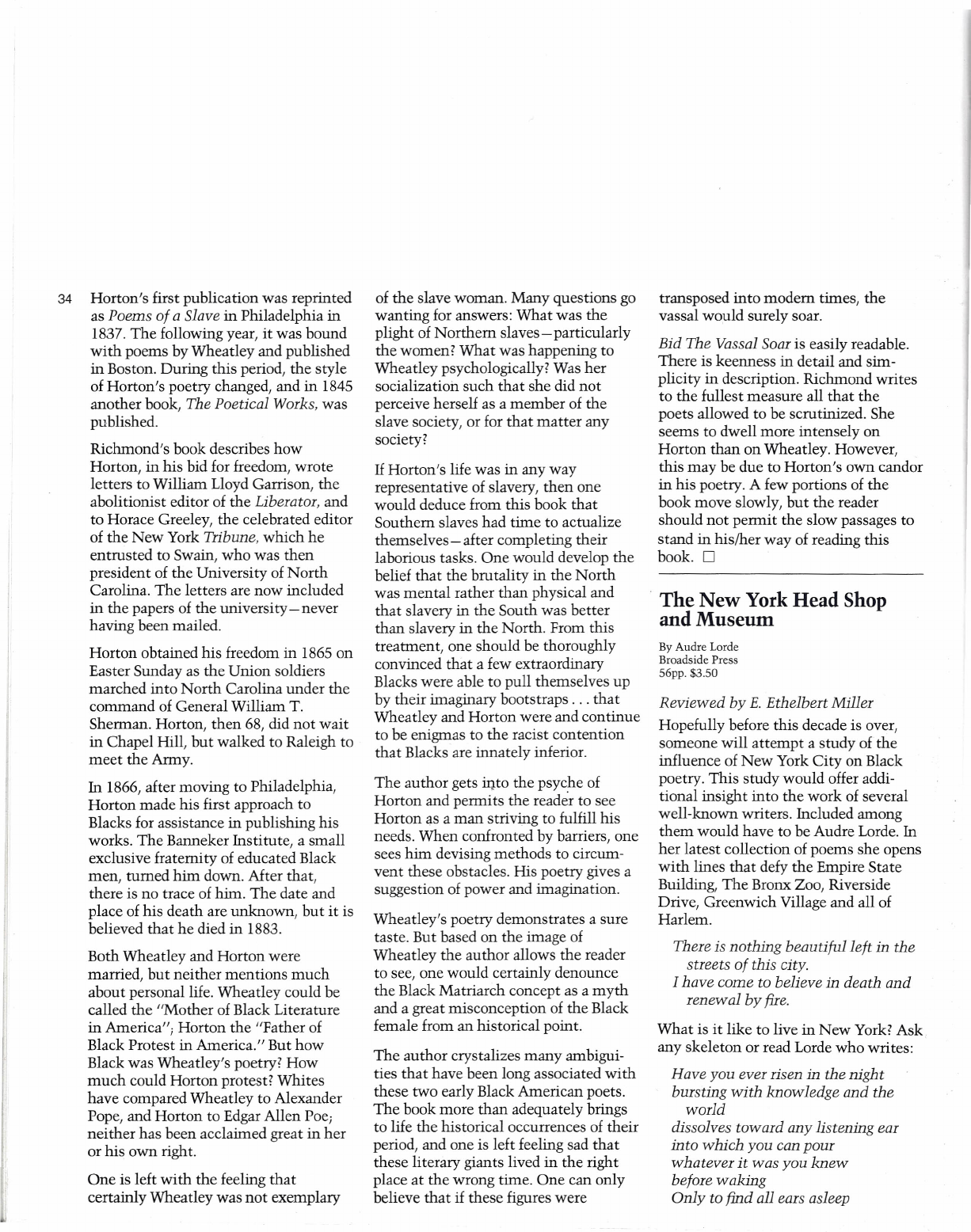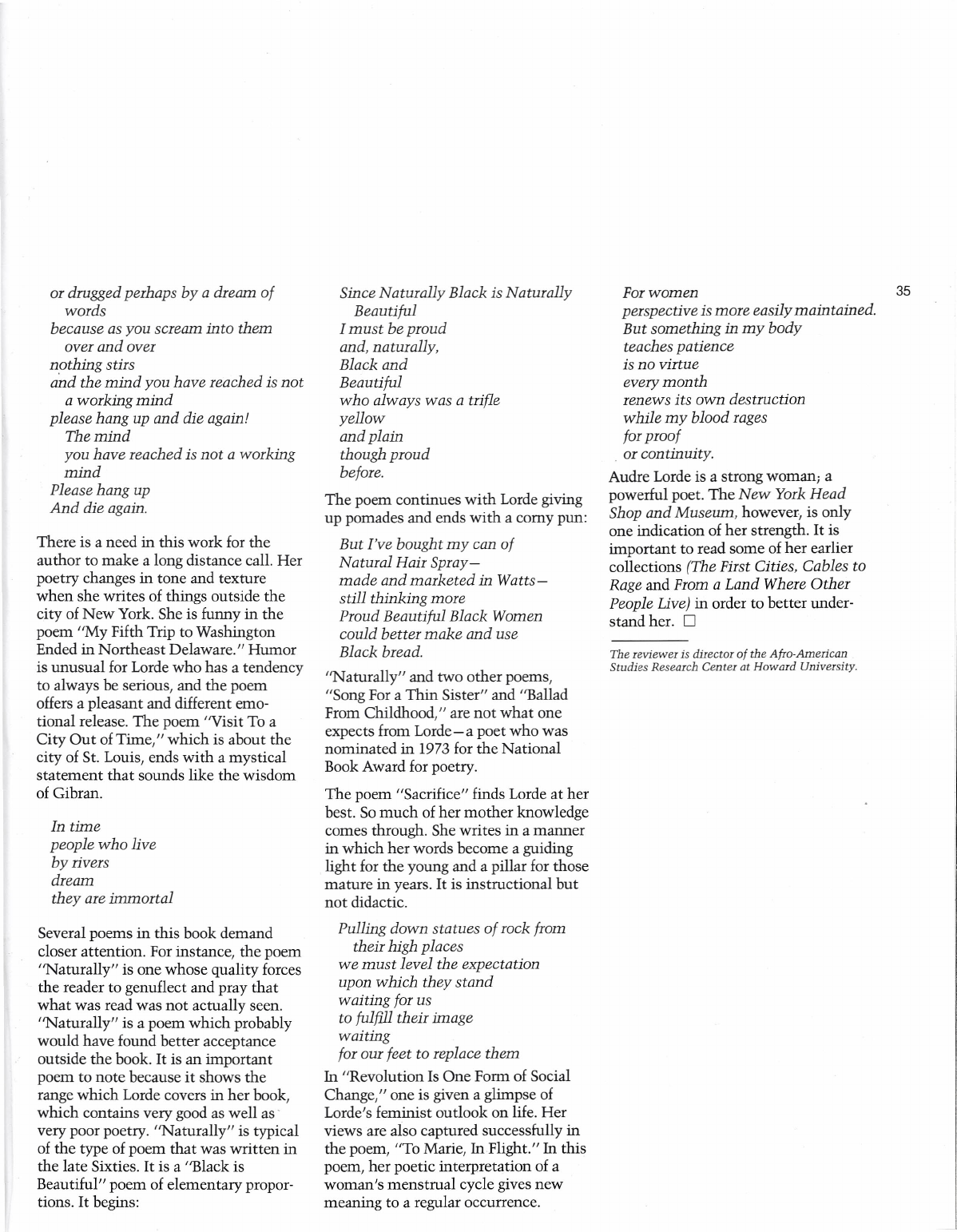
New Directions New Directions
Volume 2 Issue 4 Article 8
10-1-1975
Book Review: The New York Head Shop and Museum Book Review: The New York Head Shop and Museum
E. Ethelbert Miller
Follow this and additional works at: https://dh.howard.edu/newdirections
Recommended Citation Recommended Citation
Miller, E. Ethelbert (1975) "Book Review: The New York Head Shop and Museum,"
New Directions
: Vol. 2:
Iss. 4, Article 8.
Available at: https://dh.howard.edu/newdirections/vol2/iss4/8
This Article is brought to you for free and open access by Digital Howard @ Howard University. It has been
accepted for inclusion in New Directions by an authorized editor of Digital Howard @ Howard University. For more
information, please contact digitalser[email protected].

34
Horton's first publication was reprinted
as Poems of a Slave in Philadelphia in
1837. Thefollowing year, it was bound
with poems by Wheatley and published
in Boston. During this period, the style
of Horton's poetry changed, and in 1845
another book, The Poetical Works, was
published.
Richmond's book describes how
Horton, in his bid for freedom, wrote
letters to William Lloyd Garrison, the
abolitionist editor of the Liberator, and
to Horace Greeley, the celebrated editor
of the New York Tribune, which he
entrusted to Swain, who was then
president of the University of North
Carolina. The letters are now included
in the papers of the university-never
having been mailed.
Horton obtained his freedom in 1865 on
Easter Sunday as the Union soldiers
marched into North Carolina under the
command of General William T.
Sherman. Horton, then 68, did not wait
in Chapel Hill, but walked to Raleigh to
meet the Army.
In 1866, after moving to Philadelphia,
Horton made his first approach to
Blacks for assistance in publishing his
works. The Banneker Institute, a small
exclusive fraternity of educated Black
men, turned him down. After that,
there is no trace of him. The date and
place of his death are unknown, but it is
believed that he died in 1883.
Both Wheatley and Horton were
married, but neither mentions much
about personal life. Wheatley could be
called the "Mother of Black Literature
in America"; Horton the "Father of
Black Protest in America." But how
Black was Wheatley's poetry? How
much could Horton protest? Whites
have compared Wheatley to Alexander
Pope, and Horton to Edgar Allen Poe,
neither has been acclaimed great in her
or his own right.
One is left with the feeling that
certainly Wheatley was not exemplary
of the slave woman. Many questions go
wanting for answers: What was the
plight of Northern slaves-particularly
the women? What was happening to
Wheatley psychologically? Was her
socialization such that she did not
perceive herself as a member of the
slave society, or for that matter any
society?
1£Horton's life was in any way
representative of slavery, then one
would deduce from this book that
Southern slaves had time to actualize
themselves - after completing their
laborious tasks. One would develop the
belief that the brutality in the North
was mental rather than physical and
that slavery in the South was better
than slavery in the North. From this
treatment, one should be thoroughly
convinced that a few extraordinary
Blacks were able to pull themselves up
by their imaginary bootstraps ... that
Wheatley and Horton were and continue
to be enigmas to the racist contention
that Blacks are innately inferior.
The author gets into the psyche of
Horton and permits the reader to see
Horton
;).S
a man striving to fulfill his
needs. When confronted by barriers, one
sees him devising methods to circum-
vent these obstacles. His poetry gives a
suggestion of power and imagination.
Wheatley's poetry demonstrates a sure
taste. But based on the image of
Wheatley the author allows the reader
to see, one would certainly denounce
the Black Matriarch concept as a myth
and a great misconception of the Black
female from an historical point.
The author crystalizes many ambigui-
ties that have been long associated with
these two early Black American poets.
The book more than adequately brings
to life the historical occurrences of their
period, and one is left feeling sad that
these literary giants lived in the right
place at the wrong time. One can only
believe that if these figures were
transposed into modem times, the
vassal would surely soar.
Bid The Vassal Soar is easily readable.
There is keenness in detail and sim-
plicity in description. Richmond writes
to the fullest measure all that the
poets allowed to be scrutinized. She
seems to dwell more intensely on
Horton than on Wheatley. However,
this may be due to Horton's own candor
in his poetry. A few portions of the
book move slowly, but the reader
should not permit the slow passages to
stand in his/her way of reading this
book. 0
. The New York Head Shop
and Museum
By Audre Lorde
Broadside Press
56pp. $3.50
Reviewed by E. Ethelbert Miller
Hopefully before this decade is over,
someone will attempt a study of the
influence of New York City on Black
poetry. This study would offer addi-
tional insight into the work of several
well-known writers. Included among
them would have to be Audre Lorde. In
her latest collection of poems she opens
with lines that defy the Empire State
Building, The Bronx Zoo, Riverside
Drive, Greenwich Village and all of
Harlem.
There is nothing beautiful left in the
streets of this city.
I have come
to
believe in death and
renewal by fire.
What is it like to live in New York? Ask
any skeleton or read Lorde who writes:
Have you ever risen in the night
bursting with knowledge and the
world
dissolves toward any listening ear
into which you can pour
whatever it was you knew
before waking
Only
to
find all ears asleep
1
Miller: Book Review: The New York Head Shop and Museum
Published by Digital Howard @ Howard University, 1975

or druggedperhaps by a dream of
words
because as you scream into them
over and over
nothing stirs
dnd the mind you have reached is not
a working mind
please hang up and die again!
The mind
you have reached is not a working
mind
Please hang up
And die again.
There is a need in this work for the
author to make a long distance call. Her
poetry changes in tone and texture
when she writes of things outside the
city of New York. She is funny in the
poem "My Fifth Trip to Washington
Ended in Northeast Delaware." Humor
is unusual for Lorde who has a tendency
to always be serious, and the poem
offers a pleasant and different emo-
tional release. The poem "Visit To a
City Out of Time," which is about the
city of St. Louis, ends with a mystical
statement that sounds like the wisdom
of Gibran.
In time
people who live
by rivers
dream
they are immortal
Several poems in this book demand
closer attention. For instance, the poem
"Naturally" is one whose quality forces
the reader to genuflect and pray that
what was read was not actually seen.
"Naturally" is a poem which probably
would have found better acceptance
outside the book. It is an important
poem to note because it shows the
range which Lorde covers in her book,
which contains very good as well as'
very poor poetry. "Naturally" is typical
of the type of poem that was written in
the late Sixties. It is a "Black is
Beautiful" poem of elementary propor-
tions. It begins:
Since Naturally Black is Naturally
Beautiful
I must be proud
and, naturally,
Black and
Beautiful
who always was a trifle
yellow
and plain
though proud
before.
The poem continues with Lorde giving
up pomades and ends with a corny pun:
But I've bought
my
can of
Natural Hair Spray-
made and marketed in Watts-
still thinking more
Proud Beautiful Black Women
could better make and use
Black bread.
"Naturally" and two other poems,
"Song For a Thin Sister" and "Ballad
From Childhood," are not what one
expects from Lorde-a poet who was
nominated in 1973 for the National
Book Award for poetry.
The poem "Sacrifice" finds Lorde at her
best. So much of her mother knowledge
comes through. She writes in a manner
in which her words become a guiding
light for the young and a pillar for those
mature in years. It is instructional but
not didactic.
Pulling down statues of rock from
their high places
we must level the expectation
upon which they stand
waiting for us
to fulfill their image
waiting
for our feet to replace them
In "Revolution Is One Form of Social
Change," one is given a glimpse of
Lorde's feminist outlook on life. Her
views are also captured successfully in
the poem, "To Marie, In Flight." In this
poem, her poetic interpretation of a
woman's menstrual cycle gives new
meaning to a regular occurrence.
Forwomen
perspective is more easily maintained.
But something in
my
body
teaches patience
is no virtue
every month
renews its own destruction
while
my
blood rages
for proof
. or continuity.
Audre Lorde is a strong woman; a
powerful poet. The New York Head
Shop and Museum, however, is only
one indication of her strength. It is
important to read some of her earlier
collections (The First Cities, Cables to
Rage and From a Land Where Other
People Live) in order to better under-
stand her. D
The reviewer
is
director of the Afro-American
Studies Research Center at Howard University.
35
2
New Directions, Vol. 2 [1975], Iss. 4, Art. 8
https://dh.howard.edu/newdirections/vol2/iss4/8
